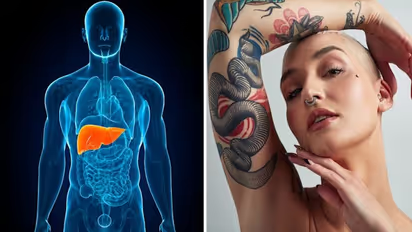World Liver Day: Can tattoos and body piercings cause liver damage? Read THIS

Synopsis
We spoke to Dr. Praveen Bharadwaj, Consultant - Dermatology, Manipal Hospital Whitefield, who advised us to consult a doctor before getting a tattoo or piercing to assess the risk.
Tattoos and body piercings are popular forms of self-expression and have become increasingly common over the years. However, some concerns have been raised about the potential risks associated with these practices, including the possibility of liver damage.
Tattoo-making and body piercings are invasive procedures that carry a risk of blood-borne infections. Excessive demand and unauthorized centres result in the use of unsterile instruments. This may result in liver infections like hepatitis B and hepatitis C, leading to liver damage.
Also Read: Are you suffering from Arthritis pain? These are 5 food items you must avoid to remain fit, active
The concern arises from using non-sterile equipment and contaminated ink or piercing materials that can transmit infections like hepatitis B and C to the body. These viruses can lead to liver inflammation and, if left untreated, cause liver damage over time. It is crucial to choose a reputable tattoo or piercing studio that adheres to proper sterilization practices and to ensure that all equipment used is new or sterilized before use. Additionally, individuals with pre-existing liver conditions should consult with their doctor before getting a tattoo or piercing to assess their risk.
Also Read: Here are three incredible Ayurvedic herbs to make your skin radiant in summers
WHAT ARE THE PRECAUTIONS ONE MUST TAKE BEFORE GETTING A TATTOO DONE?
- Choose a good place for getting a tattoo done. Check for the certification of the tattoo artist, the quality of ink being used. Also request for the use of sterilized instruments. Also, check yourself for any liver infections like hepatitis B and C before taking the procedure for the safety of everyone.
- Get vaccinated for hepatitis B if not done.
- Take proper care of your skin. Hydrated soft skin is very suitable for tattoo making. Apply moisturizers regularly, and always use a gentle soap. Tanned skin may result in the improper selection of pigments, and use sunscreen regularly.
- People with skin conditions like psoriasis, unstable vitiligo and lichen planus must avoid getting tattoos as there may be increased lesions, also known as Koebner’s phenomenon. Similarly, tattoos should be avoided in people having active eczema or allergic rashes as they might cause reactions to the tattoo pigments. A tattoo should not be done on infected areas having boils, acne, Herpes or fungal infections. It is always advised to take opinion from your dermatologist if you have any such skin conditions.
- Few people tend to get keloids; they must avoid getting tattoos.
- Stay hydrated, drink a lot of water during the week; avoid excessive coffee and alcohol for at least 24 hours before getting tattooed.
- Refraining from taking aspirin or blood-thinning medication for a minimum of 24 hours before getting a tattoo is recommended. Inform in case you have a fever or illness and reschedule your appointment.
- Decide your design and tattoo colour in advance. A few colours cannot be removed even with Laser, so consider this if you plan to remove the tattoo in the future.
- Have a proper bath, wear light clothes and have a good meal before the procedure.
- Please inform if you have itching, skin rashes or any other issues during the procedure or immediately after. Very rarely, allergies may happen with the procedure.
Explore the latest Lifestyle News covering fashion, wellness, travel, Food and Recipes, and more. Stay updated with trending Health News, fitness tips, and expert insights to inspire your daily living. Discover personalized lifestyle trends that keep you stylish and informed. Download the Asianet News Official App from the Android Play Store and iPhone App Store for everything that adds value to your everyday life.